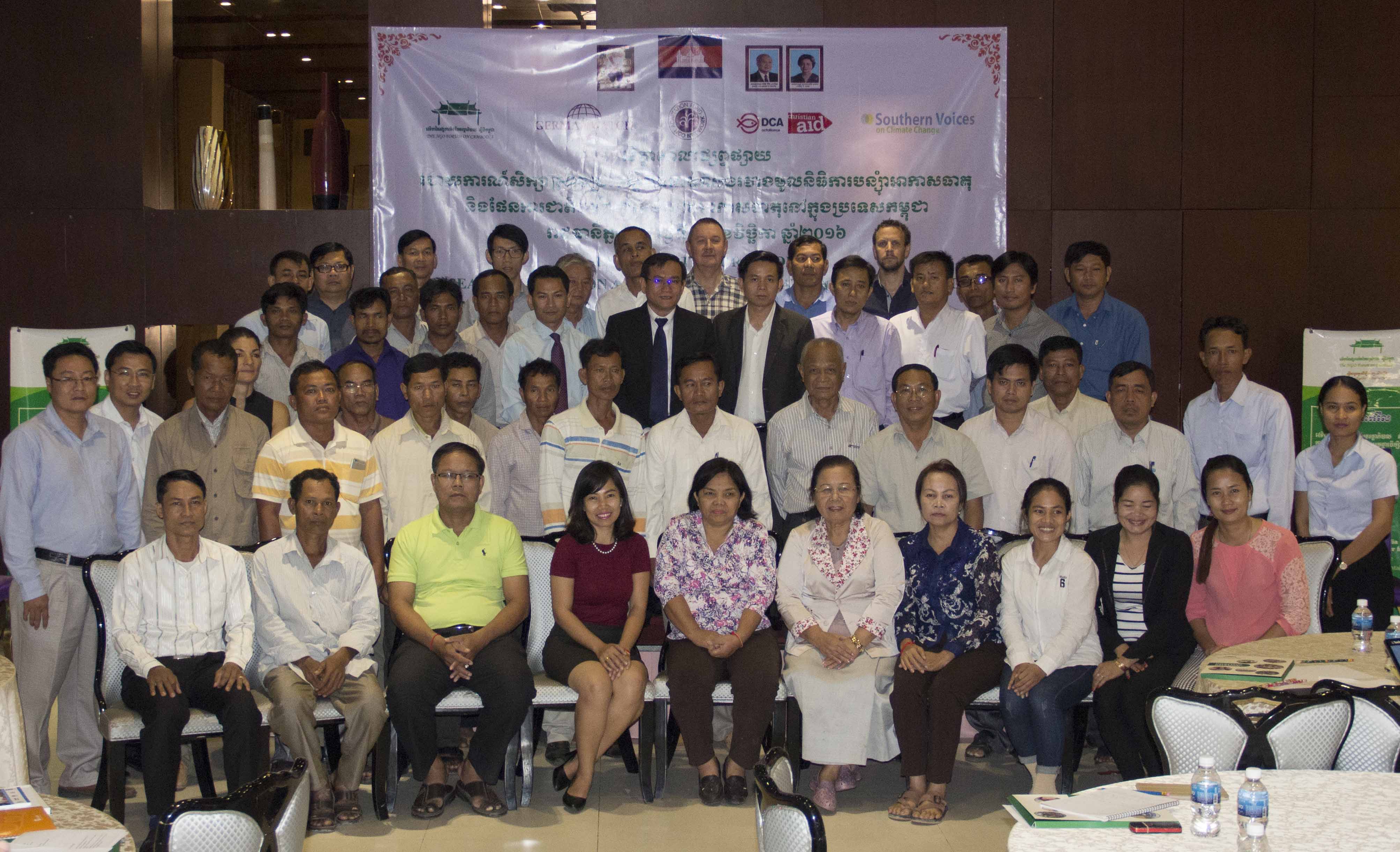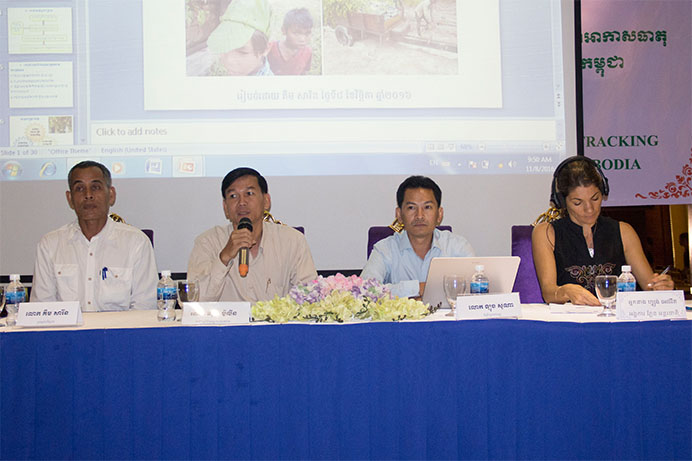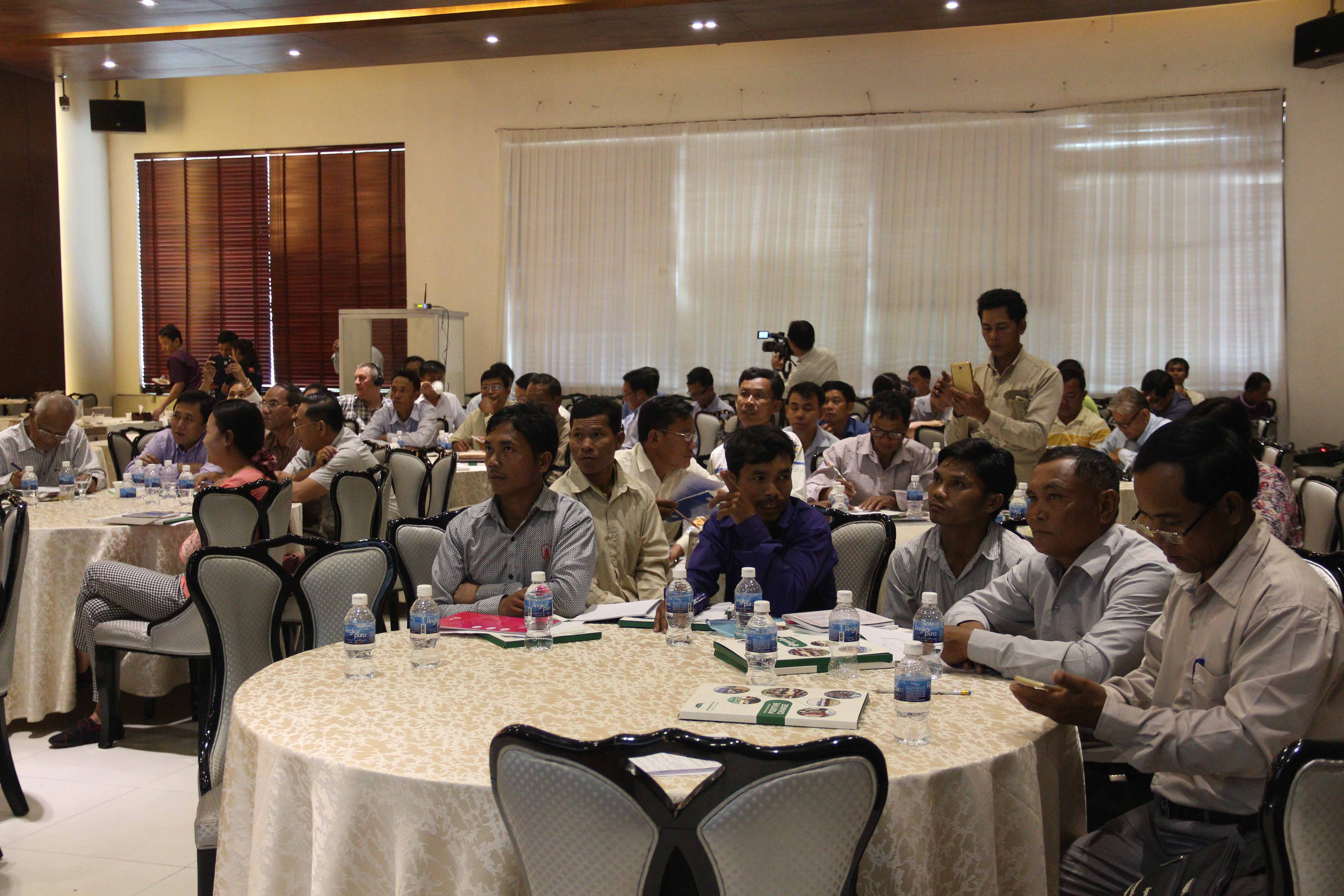
Phnom Penh; Cambodia, 08 November 2016: Through Climate Change Policy Monitoring Project, NGO Forum actively working with Adaptation Fund NGO Network, GermanWatch, DCA/CA and Southern Voice host Disseminate Workshop on Adaptation Fund Tracking and National Adaptation Plan (NAP) Linkage in Cambodia at Tonle Bassac II Restuarant, Phnom Penh, Cambodia. There are approximately 67 participants (11 Female) to join this workshop. They are government officers, embassy representative, academics, youth, development partners, NGOs members and affected communities. The objectives of event are:1) share experiences of good practice and challenges on Climate Change Adaptation Projects and Climate Change Policy, National Adaptation Plan (NAP) in Cambodia; and 2) present the result of research with strategic recommendations to relevant stakeholders such as UN agencies, decision makers, academics, NGOs and communities on the situation of climate change finance in Cambodia.

This workshop also call to action in relation to the Paris Agreement as well as the twenty-second session of the Conference of the Parties (COP 22) will be held in Bab Ighli, Marrakech, Morocco from 7-18 November 2016
During the Open Session, both H.E Khiev Borin, Director General, General Directorate of Community Development, Ministry of Environment and Tek Vannara, PhD; NGOF Executive Director are strongly highlight that Cambodia is consistently ranked amongst the most vulnerable countries to climate change, and one of the three most vulnerable in Asia. This is because the country is exposed to frequent flooding and other unpredictable rainfall events as well as to tropical storms and sea-level rise and has a low adaptive capacity.
Tek Vannara, PhD; NGOF Executive Director added that we recognized that climate change affected Cambodia economic growth and social welfare. Human activity is major cause of increasing GHGs concentration in atmosphere system. Least developing countries including Cambodia are the most vulnerable to impact of climate change due to lack of knowledge, technologies, adaptive capacity, resources, etc. Response to above challenges, Cambodia governments had adopted many policy frameworks, and institutional arrangements. While NGOs is playing an important role to support government policies implementation and closing the gaps. Climate change financing is required to support those policy implementation and capacity building. Climate change financing is very important for supporting the climate smart programme in Cambodia. Analysis report of NGO Forum in 2013 reflected that total fund for 95 projects are USD 655.6 million (36% concessional loan).
However, climate change mainstreaming into sub national (commune investment plan) is still challenges related to finance support and technical issues. We need to address all those challenges and strengthening our readiness finance system and institutions to access international sources in future.
Today workshop will be updated you the climate change financing flow both external and domestic sources to Cambodia. The finance mechanism is channeled through multilateral funds – such as the Global Environment Facility and the Climate Investment Funds – as well as increasingly through bilateral channels. In addition, a growing number of recipient countries have set up national climate change funds that receive funding from multiple developed countries in an effort to coordinate and align donor interests with national priorities. The costs of the adaptation to climate change in developing countries in range USD28-67 billion per year under the UNFCCC framework till 2030 while the least development country fund and the Special Climate Change Fund have disbursed the most finance for adaptation.
Recently, vulnerability assessment found that 17.2% of communes were found to be “highly” vulnerable and 31.5% to be “quite” vulnerable to multiple climate change hazards, namely floods, storms and droughts. Under the UNFCC framework, there are the global fund available such as Global Environment Facility Fund, Climate Investment Fund (CIF), Adaptation Fund, Global Climate Change Alliance (GCCA), Green Climate Fund. Those fund mechanism were established in difference aiming and thematic to support to less developing country and developing country such as Cambodia.
This research finding has found that, Cambodia needs sustained financial resources to deal with the impacts of climate change. Through the analysis and result of the research, there are a series of recommendations are providing as following:
1. Call for more investment in Adaptation will save lives, ecosystems and assets. Not only is adaptation vital to the right of the populations. It is also to the best interest of other countries dependent on the health of the biodiversity, the human resources from, and the economies of Cambodia.
2. Adaptation action must be “country-driven, gender-responsive, participatory and fully transparent approach, taking into consideration vulnerable groups, communities and ecosystems, and should be based on and guided by the best available science and, as appropriate, traditional knowledge, knowledge of indigenous peoples and local knowledge systems, with a view to integrating adaptation into relevant socioeconomic and environmental policies and actions, where appropriate
3. Strengthening the Ministry of Environment and National Council for Sustainable Development to better coordinate the financing-related activities for the NAP, including those related with accessing the Green Climate Fund (GCF);
4. Strengthening Ministry of Economic and Finance on the capacity to assess and monitor impacts of climate change on the economic, and to use this capacity in the management of public finance, particularly through the national budget process;
5. Mainstreaming Climate change into the national budget;
6. Customization and adjustment of ODA database on Adaptation Fund;
7. Provide new and additional climate change finance in line with commitments under the UNFCCC, but also ensure that traditional ODA projects are “climate smart”;
8. For projects identified as climate relevant, ensure at the project formulation stage that technical inputs are received from NCSD and/or the climate working group in the concerned ministry, including on applicable climate-proofing standards or other required measures, and include the related costs and inputs in the project budget;
9. When providing sector or general budget support, include climate change in the results framework (in line with the CCCSP and the national M&E framework for climate change), and provide climate finance in support of these objectives;
10. Increase the levels of climate finance available at the local level through the CSF, DMF and SNIF, subject to the integration of climate change in planning and budgeting procedures for these funds;
11. Where relevant, include support for climate change related capacity development interventions, both at the individual level (skills development) and at the institutional level (definition of applicable standards, rules and procedures, research and development).
